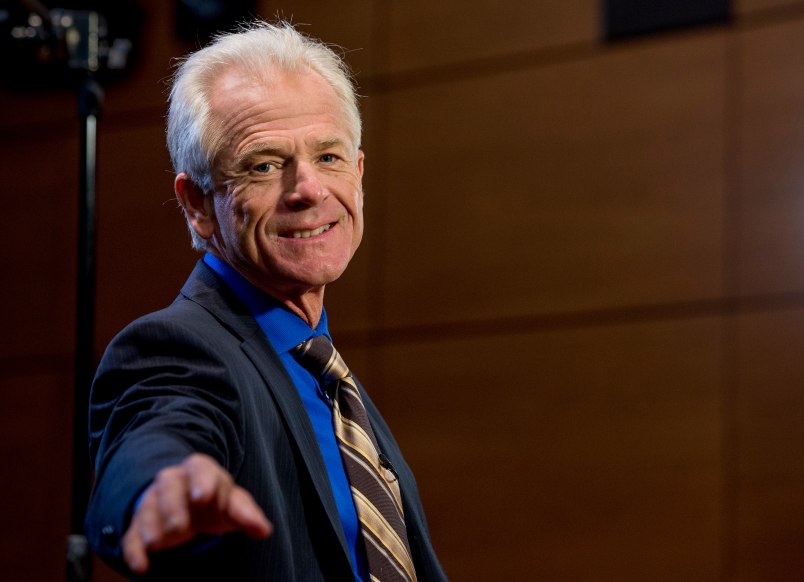In 1992, Ron Vara rode out Hurricane Andrew in his houseboat, “the Patriot,” frantically pumping water out of the craft as coconuts rammed into its side. Luckily, he’d guessed a few weeks earlier that hurricane season would ruin the insurance industry. He made a stock market bet and cashed in big.
Who is Vara? Well, he’s a Sinophobic stock market genius, the so-called “Dark Prince of Disaster,” and a “macrowave trader,” whatever that means. Also, he’s only ever been quoted by one man: White House trade adviser Peter Navarro.
There’s a reason for that: Vara doesn’t exist.
Navarro admitted the Chronicle of Higher Education Tuesday that Vara, who he quotes extensively across his many books, is actually his alter ego. “Ron Vara” is an anagram of “Navarro.”
Here are some of the quotes Navarro attributed to Vara, which mostly appear at the beginning of his books’ chapters. Note Vara’s habit of taking existing aphorisms and making them worse.
- “Put Fed Chairman Alan Greenspan and the Incredible Hulk in the stock market ring and I’ll put my money on Greenspan every time.” (“When The Market Moves, Will You Be Ready?” pp. 49)
- “A market not busy being born is busy dying.” (“When The Market Moves, Will You Be Ready?” pp. 72)
- “Ride the Stock Market Cycle — or be run over.” (“When The Market Moves, Will You Be Ready?” pp. 85)
- “The dumbest risk is taking a big one for the prospect of a little reward.” (“When The Market Moves, Will You Be Ready?” pp. 171)
- “What do capital punishment and profitable stock market investing have in common? They both depend on the execution.” (“When The Market Moves, Will You Be Ready?” pp. 207)
- “Only three things in life are certain: Death, taxes, and that every new investor inevitably pays ‘tuition’ to the market.” (“When The Market Moves, Will You Be Ready?” pp. 229)
- “What happens in China, doesn’t stay in China. It’s the ‘Butterfly Effect’ on steroids.” (“The Coming China Wars” pp. xv)
- “You’ve got to be nuts to eat Chinese food.” (“The Coming China Wars” pp. 28)
- “Give an executive team a forecast and guide it for a quarter. Teach an executive team how to forecast and guide it for a lifetime.” (“Always a Winner” Chapter 6)
- When you build a new housing subdivision, you provide jobs for a few months. When you build a new factory, you provide jobs for years.” (“Seeds of Destruction” pp. 221)
- “Only the Chinese can turn a leather sofa into an acid bath, a baby crib into a lethal weapon, and a cellphone battery into heart-piercing shrapnel.” (“Death by China” pp. 33)
- “The manufacturing Dragon is voracious. The Colonial Dragon is relentless. The American Eagle is asleep at the wheel.” (“Death by China” pp. 107)
The myth of Vara is built up extensively in one of Navarro’s books, “If It’s Raining in Brazil, Buy Starbucks” (2001).
A couple years before the boat incident, according to the book, Vara watched the Iraqi invasion of Kuwait and wondered if he’d be called to fight. He also invested in Raytheon stock, betting that the company’s missiles would prove useful.
In ’94, when Mexico devalued its peso, Vara purportedly earned $30,000 in two days betting against Citibank and the Bank of Boston. The tales of implausible financial success go on.
Navarro admitted that Vara was actually him to the Chronicle of Higher Education on Tuesday. After Australian professor Tessa Morris-Suzuki noticed Navarro’s repeated quotes of Vara while researching the Trump administration staffer, she put the pieces together.
“Initially I didn’t doubt that he was real, and assumed that he might be a businessman or maybe someone attached to conservative think-tank or the like,” Morris-Suzuki told TPM in an email. “It was only when I failed to find him at all that I spotted the anagram of Navarro’s name, and was fairly sure that he must be invented.”
Confronted with the facts — Harvard had no record of Vara’s being a doctoral student, as Navarro claimed — the Trump adviser said the character was a “whimsical device and pen name I’ve used throughout the years for opinions and purely entertainment value, not as a source of fact.”
It’s “refreshing,” Navarro said, that “somebody finally figured out an inside joke that has been hiding in plain sight for years.”
A co-author disagreed.
The Chronicle said they asked Navarro’s “Seeds of Destruction” co-author, Columbia professor Glenn Hubbard, if he knew Vara was made up, and whether Hubbard was OK with that.
“No and no,” Hubbard responded.
In the book, Vara is quoted with the aphorism: “When you build a new housing subdivision, you provide jobs for a few months. When you build a new factory, you provide jobs for years.”
Notably, Navarro’s now-staggering influence over President Donald Trump’s ongoing trade war with China can be traced back to one of his books. Jared Kushner reportedly asked Navarro to join the 2016 Trump campaign as a trade adviser after stumbling across the 2011 book “Death by China” on Amazon. That work, like a half dozen others, quotes the fake source.
Morris-Suzuki, who discovered the truth about Vara, told the Chronicle that Navarro had used Vara to drum up “fear and loathing about China.”
“The joke wore very thin,” she said.
“It might be fine for a poet or fiction writer, or even for an academic writing an obviously lighthearted satirical piece in non-academic media, but it seems quite strange to do it repeatedly in books which are presented to the public as serious and factual,” Morris-Suzuki told TPM.
This post has been updated.



